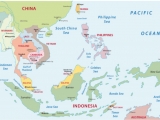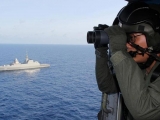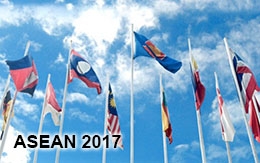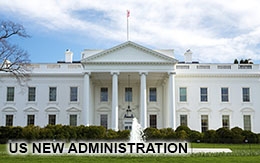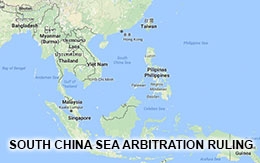Search result for "East Asia"
-
Rising Trend of Maritime Power Projection in Southeast Asia: Perspective from Cambodia
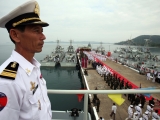 Category: PoliticsThe rising trend of maritime power projection in Southeast Asia has sparked concerns among Southeast Asian countries. As major powers increase their naval presence and influence in the region, it becomes imperative for ASEAN to respond with a more robust collective effort. By acknowledging this trend, ASEAN can work towards developing an effective and collective strategy to address these challenges.
Category: PoliticsThe rising trend of maritime power projection in Southeast Asia has sparked concerns among Southeast Asian countries. As major powers increase their naval presence and influence in the region, it becomes imperative for ASEAN to respond with a more robust collective effort. By acknowledging this trend, ASEAN can work towards developing an effective and collective strategy to address these challenges. -
Myanmar's response to maritime power projection by superpowers in Southeast Asia
 Category: PoliticsThe increasing strategic importance of maritime power projection has led to Southeast Asia, particularly Myanmar, taking measures to protect its interests and regional stability. Myanmar's response to maritime power projection by superpowers in Southeast Asia, particularly China and the United States, has been influenced by the country's geopolitical position, economic interests, and domestic considerations.
Category: PoliticsThe increasing strategic importance of maritime power projection has led to Southeast Asia, particularly Myanmar, taking measures to protect its interests and regional stability. Myanmar's response to maritime power projection by superpowers in Southeast Asia, particularly China and the United States, has been influenced by the country's geopolitical position, economic interests, and domestic considerations. -
Emission Reduction From Shipping And Net-Zero Shipping: Review On Southeast Asia Regional Policy
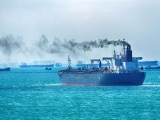 Category: EnvironmentThe work to develop legally binding measures to reduce air pollution from ships was an invitation in accordance to Article 212 of the United Nations Convention on the Law of the Sea, 1982 (UNCLOS), resolution A.719(17). As a result, IMO made a decision to include the regulation on energy efficiency for ships in the MARPOL Annex VI where it stipulates the requirements on the Energy Efficiency Design Index (EEDI) and the Ship Energy Efficiency Management Plan (SEEMP). This regulation came into force in 2013
Category: EnvironmentThe work to develop legally binding measures to reduce air pollution from ships was an invitation in accordance to Article 212 of the United Nations Convention on the Law of the Sea, 1982 (UNCLOS), resolution A.719(17). As a result, IMO made a decision to include the regulation on energy efficiency for ships in the MARPOL Annex VI where it stipulates the requirements on the Energy Efficiency Design Index (EEDI) and the Ship Energy Efficiency Management Plan (SEEMP). This regulation came into force in 2013 -
The 8th Ocean Dialogue: “40th Anniversary of UNCLOS: Promoting maritime cooperation in South East Asia”
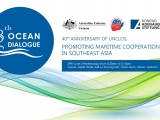 Category: Most prominent newsWith the theme “40th Anniversary of UNCLOS: Promoting maritime cooperation in South East Asia”, the 8th Ocean Dialogue seeks to discuss maritime issues of common concern in the South East Asia region, promote common understanding of UNCLOS, and explore potential maritime cooperation. The Dialogue will be participated by international experts and scholars in maritime and law of the sea issues, diplomatic missions in Hanoi, and representatives of relevant ministries, government agencies, and research institutions from Southeast Asian countries and beyond. Co-organizers: The Diplomatic Academy of Vietnam (DAV), the Konrad Adenauer Stiftung (KAS) office, and Australian Embassy in Hanoi
Category: Most prominent newsWith the theme “40th Anniversary of UNCLOS: Promoting maritime cooperation in South East Asia”, the 8th Ocean Dialogue seeks to discuss maritime issues of common concern in the South East Asia region, promote common understanding of UNCLOS, and explore potential maritime cooperation. The Dialogue will be participated by international experts and scholars in maritime and law of the sea issues, diplomatic missions in Hanoi, and representatives of relevant ministries, government agencies, and research institutions from Southeast Asian countries and beyond. Co-organizers: The Diplomatic Academy of Vietnam (DAV), the Konrad Adenauer Stiftung (KAS) office, and Australian Embassy in Hanoi -
Major power competition in the South China Sea and Southeast Asian responses
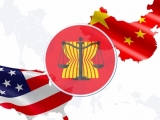 Category: PoliticsMajor power competition, particularly the growing Sino-US multi-faceted rivalry characterized global politics in 2020. The South China Sea featured prominently in this rivalry in 2020.
Category: PoliticsMajor power competition, particularly the growing Sino-US multi-faceted rivalry characterized global politics in 2020. The South China Sea featured prominently in this rivalry in 2020. -
Concert of Indo-Pacific: An Option for Peace and Order in the East Asian Seas
Category: PoliticsSuggestions for lasting peace in the South China Sea and beyond need to incorporate small and medium states as well -
The EU's interest and policy towards East Asia maritime security
Category: PoliticsThe EU is better suited to pursue its interests East Asia through the promotion of multilateral ocean governance and concrete collaboration measures. -
Law Of The Sea And Ocean Governance In Southeast Asia: Comparative Lessons From Europe On Pragmatism And Principle
Category: Working PapersOne of the most pressing challenges in contemporary law of the sea relates to how best to reconcile the increased assertion by States of territorial sovereignty over offshore geographical features with the corresponding curtailment of navigation freedoms. -
Critical Security and Economic Dilemmas for Southeast Asia in the South China Sea: A Philippine Perspective
Category: SecurityCritical Security and Economic Dilemmas for Southeast Asia in the South China Sea: A Philippine Perspective -
The Major Powers’ Relations in the South China Sea from Chinese Perspectives
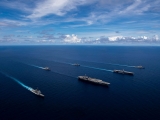 Category: Most prominent newsThe South China Sea is one of the most important maritime communications in the world, connecting the Pacific Ocean and the Indian Ocean. About 50,000 merchant ships and nearly 50% of oil tankers of the world pass through the South China Sea every year. Under the current very complicated and turbulent international situation, if the peace and stability in the South China Sea can be maintained, the development and prosperity of East Asia-Pacific region can be realized.
Category: Most prominent newsThe South China Sea is one of the most important maritime communications in the world, connecting the Pacific Ocean and the Indian Ocean. About 50,000 merchant ships and nearly 50% of oil tankers of the world pass through the South China Sea every year. Under the current very complicated and turbulent international situation, if the peace and stability in the South China Sea can be maintained, the development and prosperity of East Asia-Pacific region can be realized. -
Big Power Rivalry, ASEAN’s Dilemmas and Strategic Situation in the South China SeaCategory: Most prominent newsWhile Southeast Asia has been looking for the post-pandemic recovery the regional strategic situation continues to be defined by the rising tensions of big powers, primarily of China and the USA. These tensions are not new and emerge from the pre-pandemic years of growing regional complexity and conflicting visions of the regional order. With this international context in mind the paper aims to assess the South China Sea as a two-level problem. The dynamics at the first level is mainly defined by the ASEAN member states and at the second one – by China and the USA.
-
The Rise of ‘Minilateralism’: The ASEAN and its Struggle for Centrality in the South China Sea
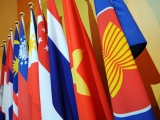 Category:The paper analyzes the intersection of three key currents in Asian geopolitics, namely (i) the emergence Association of Southeast Asian Nations (ASEAN) as a fulcrum of pan-regional integration, (ii) the evolution of South China Sea disputes as the preeminent geopolitical conflict of the 21st century, if not the site of the next great war; and, (iii) full commencement of the New Cold War between the United States (US) and China, dispensing with four decades of ‘constructive engagement’ vis-à-vis Beijing. Once seen as the harbinger of an open, inclusive and multilateralist order in the Asia-Pacific, the ASEAN has struggled to assert its ...
Category:The paper analyzes the intersection of three key currents in Asian geopolitics, namely (i) the emergence Association of Southeast Asian Nations (ASEAN) as a fulcrum of pan-regional integration, (ii) the evolution of South China Sea disputes as the preeminent geopolitical conflict of the 21st century, if not the site of the next great war; and, (iii) full commencement of the New Cold War between the United States (US) and China, dispensing with four decades of ‘constructive engagement’ vis-à-vis Beijing. Once seen as the harbinger of an open, inclusive and multilateralist order in the Asia-Pacific, the ASEAN has struggled to assert its ... -
A Japanese Perspective of South China Sea Order
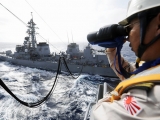 Category: International LawEast Asia is a huge seascape. As a result, the sea’s connecting power is of a priceless importance to the entire region. The rules-based international maritime order is in everyone’s interest, including Japan.
Category: International LawEast Asia is a huge seascape. As a result, the sea’s connecting power is of a priceless importance to the entire region. The rules-based international maritime order is in everyone’s interest, including Japan. -
A SOUTH CHINA SEA CODE OF CONDUCT: A HOPEFUL REALITY OR A HOPELESS FALSITY?
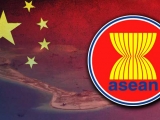 Category: Expert InterviewThe Maritime Issues conducts a conversation with Southeast Asia-based experts on issues related to a Code of Conduct (COC) for the South China Sea
Category: Expert InterviewThe Maritime Issues conducts a conversation with Southeast Asia-based experts on issues related to a Code of Conduct (COC) for the South China Sea -
The ‘South Sea’ and ASEAN: Failing Unity amidst Beijing’s Duplicitous Diplomacy
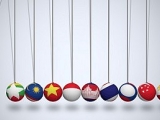 Category: Working PapersThe Association of Southeast Asian Nations (ASEAN) has sought to address the challenges of the disputes in the South China Sea for close to a quarter of a century. This paper examines the circumstances and extent to which ASEAN has been effective in its response to the South China Sea dispute as well as the manner and means by which Beijing’s approach to the dispute has been influenced at the regional level.
Category: Working PapersThe Association of Southeast Asian Nations (ASEAN) has sought to address the challenges of the disputes in the South China Sea for close to a quarter of a century. This paper examines the circumstances and extent to which ASEAN has been effective in its response to the South China Sea dispute as well as the manner and means by which Beijing’s approach to the dispute has been influenced at the regional level. -
The South China Sea in the Broader Maritime Security of the Indo-Pacific: The Economic Context for Regional Conflict and Cooperation
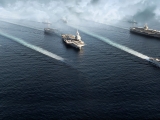 Category: Working PapersEast and Southeast Asia have seen considerable economic growth over the past few decades. The pace of development in China has been virtually unprecedented, with millions of people being raised above severe poverty to a middle-class lifestyle. This outcome has resulted from national investments in human capital and infrastructure and policies that have encouraged business growth and trade.
Category: Working PapersEast and Southeast Asia have seen considerable economic growth over the past few decades. The pace of development in China has been virtually unprecedented, with millions of people being raised above severe poverty to a middle-class lifestyle. This outcome has resulted from national investments in human capital and infrastructure and policies that have encouraged business growth and trade. -
India’s Maritime Strategy In The Indo-Pacific
 Category: CommentaryThough India has always been seen as a continental power, it is worth remembering that it has a long coastline of 7516.6 kilometers. In the past, Indian influence and customs spread by the sea route to Southeast Asia, East Asia and many other parts of the world. The island of Bali, in Muslim-majority Indonesia is still a Hindu-majority island whereas the state philosophy of Indonesia is Pancasila, which is derived from the Sanskrit words “panca” meaning five and “sila” meaning principles. So why is India paying increased attention to the maritime domain?
Category: CommentaryThough India has always been seen as a continental power, it is worth remembering that it has a long coastline of 7516.6 kilometers. In the past, Indian influence and customs spread by the sea route to Southeast Asia, East Asia and many other parts of the world. The island of Bali, in Muslim-majority Indonesia is still a Hindu-majority island whereas the state philosophy of Indonesia is Pancasila, which is derived from the Sanskrit words “panca” meaning five and “sila” meaning principles. So why is India paying increased attention to the maritime domain? -
The South China Sea in the Broader Maritime Security of the Indo-Pacific 2016_SESSION 2
 Category: VideosSESSION 2: Critical security and economic dilemmas for Southeast Asia in the South China Sea
Category: VideosSESSION 2: Critical security and economic dilemmas for Southeast Asia in the South China Sea
© 2016 Maritime Issues


